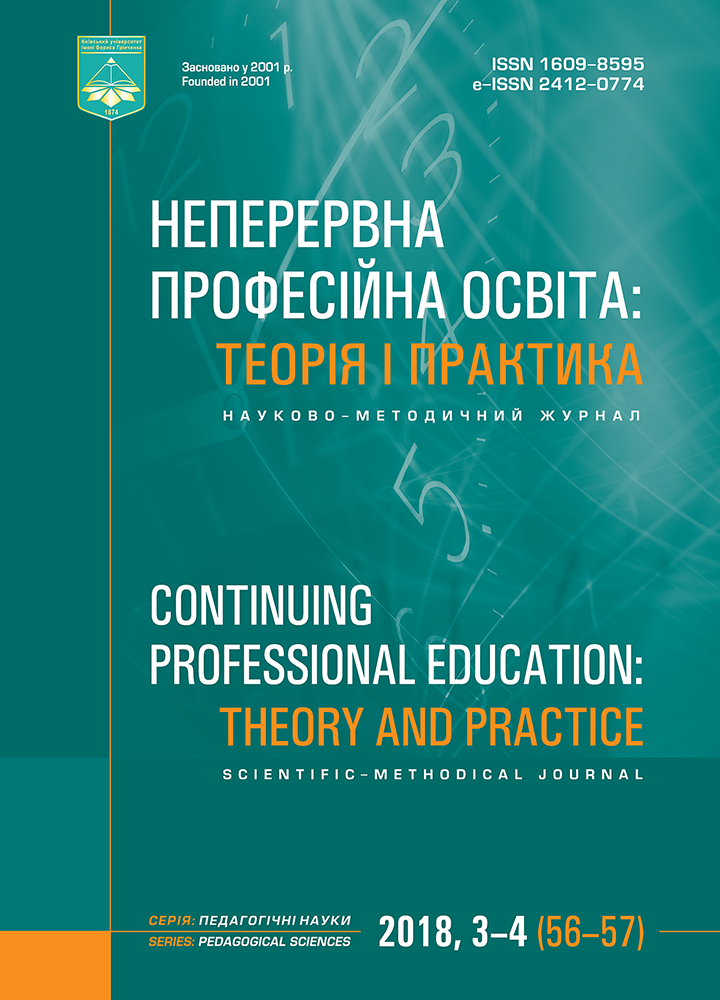REGULATORY SUPPORT OF ADULT EDUCATION IN EU COUNTRIES
DOI:
https://doi.org/10.28925/1609-8595.2018.3-4.105110Keywords:
adult education, European Union, formal, non-formal and informal education, legal regulation of adult education, lifelong education.Abstract
In the article, the analysis of the European Parliament's normative legal documents on adult education has been carried out. The role and significance of lifelong learning at the present stage have been determined by the help of normative acts. Trends and vectors of adult education development are: popularization of education among the adult population, the use of the latest educational technologies, improvement of teaching methods, involving different target groups in education, formal recognition of non-formal and informal education, provision of qualified pedagogical personnel to the adult education system. The tasks of adult education are: increasing access to adult education; development of new approaches to adult education; promotion of adult education among the public; encouraging the development of new adult education systems; comprehensive provision of high-quality non-formal and informal education for adults; promoting employers' awareness of the benefits of adult learning: adult education contributes to increasing workers’ productivity, competitiveness, creativity, introduction of innovations and entrepreneurship is an important factor of increasing the mobility of employees in the labor market encouraging adults to enter higher education institutions; promoting a balanced distribution of learning and educational resources throughout the lifecycle of a person; creation of well-developed educational provision for the elderly. The ways of realization of the set tasks are: to identify priority target groups for education at the national level; to educate adults in accordance with the stages; to offer adults an opportunity to take tests; to provide proposals for education for migrants; to carry out a periodic check of non-formal and informal education; to implement motivational and informational and advocacy measures. In the article, the main proposals of the European Parliament on further prospects for improving the adult education system have been highlighted.References
Commission Recommendation 2008/867/EC on the active inclusion of people excluded from the labour market (2008). Official Journal of the European Union, 51 (18 November), 11–14 (eng).
Council Recommendation on Upskilling Pathways: New Opportunitiesf or Adults (2016). Official Journal of the European Union, 59 (24 December), 1–6 (eng).
Council Recommendation on the validation of non-formal and informal learning (2012). Official Journal of the European Union, 55 (22 December), 1–5 (eng).
Council Resolution on a renewed European agenda for adult learning (2011). Official Journal of the European Union, 54 (20 November), 1–6 (eng).
Decision (EU) 2018/646 of the European Parliament and of the Council on a common framework for the provision of better services for skills and qualifications (Europass) and repealing Decision No 2241/2004/EC (2018). Official Journal of the European Union, 61 (2 May), 42–55 (eng).
European Parliament resolution on adult learning: it is never too late to learn (2008). Retrieved from http://www.europarl.europa.eu/sides/getDoc.do?type=TA&language=EN&reference=P6-TA-2008-0013 (eng).
The Council conclusions on the integration of third-country nationals legally residing in the Union (2014). Retrieved from https://www.consilium.europa.eu/media/28071/143109.pdf (eng).
The Council Recommendation on the Integration of the Long Term Unemployed into the Labour Market (2016). Official Journal of the European Union, 59 (20 February), 1–5 (eng).
The Council Resolution on better integrating lifelong guidance into lifelong learning strategies (2008). Official Journal of the European Union, 51 (13 December), 4–7 (eng).
Zakrevska, S. (2017). Vyznannia neformalnoi osvity v Belhii: teoretychni y praktychni aspekty [Recognition of non-formal education in Belgium: theoretical and practical aspects]. Pedygogichnij proces: teoriya i praktika, 3 (58), 39–43 (ukr).
Downloads
How to Cite
Issue
Section
License
Copyright (c) 2020 Anna Boiarska-Khomenko

This work is licensed under a Creative Commons Attribution-NonCommercial 3.0 Unported License.



